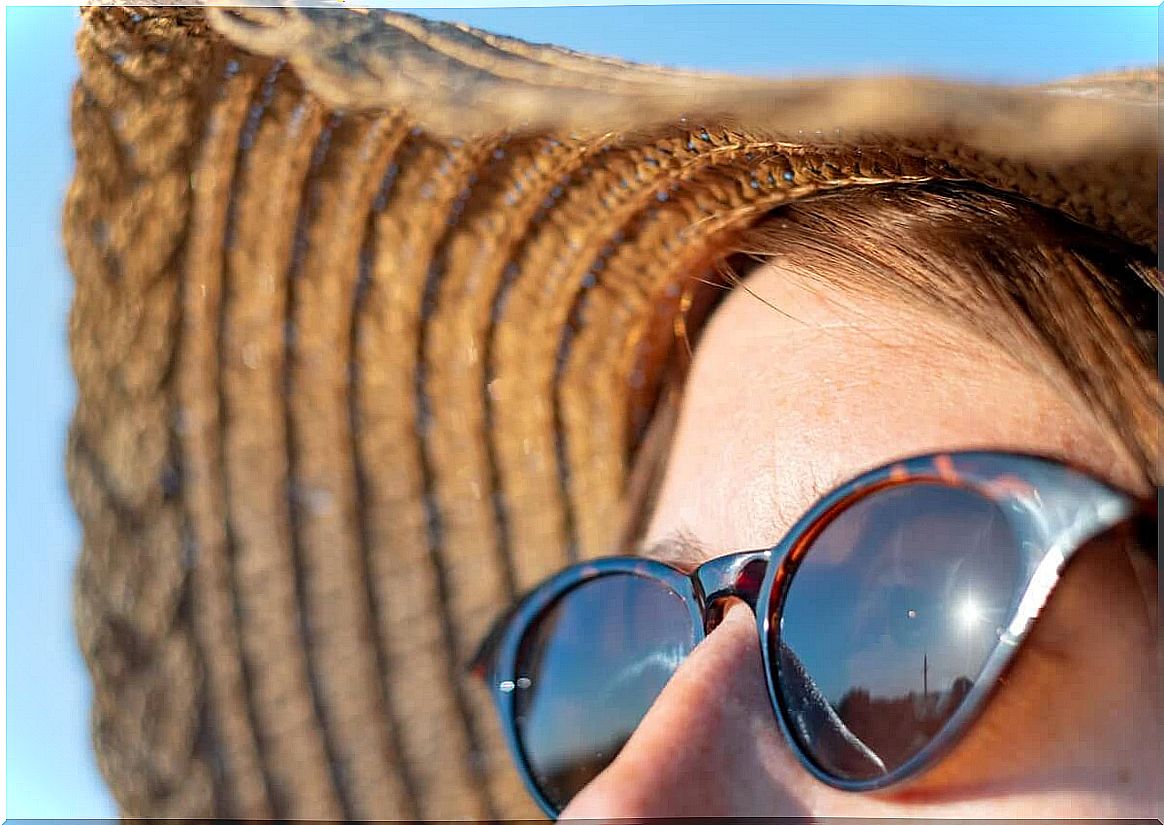Effects Of Solar Radiation On Health
The effects of solar radiation on health range from mild skin injuries to the development of cancer or disorders of the immune system. In this article, we’ll discuss precautions you should take.

The sun is the star that is closest to the earth. It has long been the subject of poetry, dreams and numerous studies. Your light is a source of life and warmth. However, this star is not all positive for humans, because the effects of solar radiation on health are not always positive.
The energy emitted by the sun is distributed in the form of radiation, but it does not completely reach the earth. This is because the atmosphere absorbs a large part of the radiation. However, the part that reaches the surface of the earth is the cause of various health problems, from heat stroke to skin cancer.
Types of solar radiation
There are different types of radiation produced by the sun. The two most notable are infrared and ultraviolet radiation. The former has a low energy intensity and little power to penetrate the skin.
Therefore, this type is usually not responsible for skin problems. In addition, it creates a feeling of warmth and stimulates blood circulation, promotes thermoregulation and is responsible for sweating.
On the other hand, there is ultraviolet radiation (UV), which barely reaches the earth, but can easily penetrate the inner layers of the skin. Depending on the type of UV radiation, it can only produce a more or less intense tan or it can cause injuries.

The connection between sun and health
While solar radiation favors processes such as vitamin D synthesis, too high a dose can be detrimental to human health. The World Health Organization (WHO) has warned of the negative effects of solar radiation.
The WHO has indicated that some of the negative consequences are as follows:
- Increased chance of developing skin cancer
- Sunburn of varying degrees
- Premature and accelerated aging : The sun’s rays can promote the formation of free radicals and cause irreversible damage to molecules and cell structures in the body
- Eye diseases of various kinds, including cataracts
Other potential damage from solar radiation has to do with the inefficiency of the immune system:
- Alteration in the functions of antigen-presenting cells: This is a group of cells of the immune system that influence the correct response of the immune system.
- Increased cytokine production: Cytokines stimulate or decrease the immune system’s response. They are mediators who reduce or multiply the defense effect according to the needs of the environment and infections from external pathogens.
- Changes in the recirculation of lymphocytes: Changes in this process can also affect the immune response as they change the way these white blood cells are distributed in tissues.
- Activation of T lymphocytes: These defense cells protect the body from infections and help fight cancer. However, if activated incorrectly, they cause external reactions that can lead to disease.
Effects of solar radiation on skin health
Skin cancer is one of the most significant health effects of solar radiation. The various oncological skin diseases have increased over the past 50 years, which seems to be related to the holes in the ozone layer. The function of this layer is to filter the sun’s rays.
Photoaging (premature aging of the skin) is another damage that excess sun can cause on the dermis. This effect of solar radiation on health manifests itself as elastosis (sun-damaged skin) in the areas most exposed to the sun (face, neck, décolleté). They also make the skin thicker, drier and more wrinkled.
Skin damaged by photoaging has spots and hyperpigmented areas due to changes in melanocytes. It also has greatly enlarged pores and is thick and rough, which is caused by hyperkeratinization , a phenomenon in which the skin becomes excessively keratinized.

Take precautions to avoid the effects of solar radiation
Not all people react the same way to the sun ; some people are therefore at a higher risk than others. Depending on your skin type, you can be more or less prone to damage. It is therefore important to take your phototype into account, as white skin, for example, is more sensitive to radiation than dark skin.
How can the effects of solar radiation on health be prevented? Basically, you have to keep in mind that the damage is cumulative.
This means that we have solar capital from birth and should not exceed it during our entire life. When we are exposed to the sun, we should use sunscreens that are appropriate for our skin type.
Children under the age of three should not be in the sun for long periods of time. The recommended time should be taken into account as well as the geographical location and the season. The sun’s rays reach the earth with different intensities depending on the altitude and the season.









